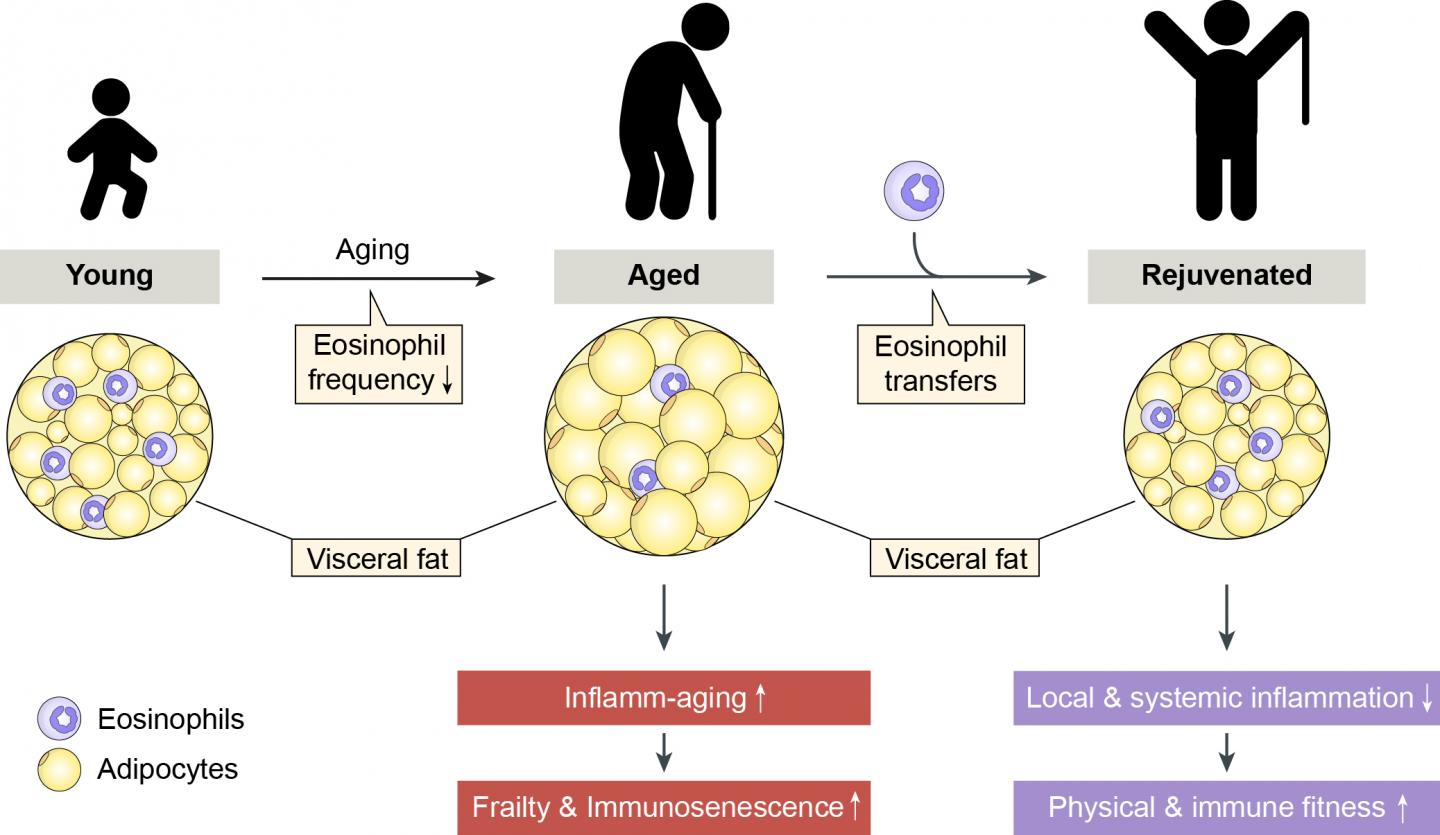
Credit: DBMR, University of Bern, D. Brigger
Elderly people are more prone to infectious diseases as the function of their immune system continuously declines with progression of age. This becomes especially apparent during seasonal influenza outbreaks or the occurrence of other viral diseases such as COVID-19. As the efficacy of vaccination in the elderly is strongly reduced, this age group is particularly vulnerable to such infectious pathogens and often shows the highest mortality rate. In addition to the age-related immune decline aged individuals are commonly affected by frailty that negatively impacts quality-of-life. Even though the average life-expectancy for humans continuous to rise, living longer is often associated with age-related health issues.
Important role of belly fat in aging processes identified
Researchers from the Department for BioMedical Reserarch (DBMR) and the Institute of Pathology at the University of Bern as well as the University Hospital Bern (Inselspital) have set out to identify new approaches to improve health-span in a fast-growing aging population. For many years scientists speculated that chronic low-grade inflammation accelerates aging processes and the development of age-related disorders. An international team of researchers under Bernese guidance has now demonstrated that visceral adipose tissue, known as belly fat, crucially contributes to the development of chronic low-grade inflammation. Scientist around Dr. Mario Noti, formerly at the Institute of Pathology of the University of Bern and Dr. Alexander Eggel from the Department for BioMedical Research (DBMR) of the Universität of Bern reported that certain immune cells in the belly fat play and an essential role in regulating chronic low-grade inflammation and downstream aging processes. They could show, that these immune cells may be used to reverse such processes. The findings of this study have been published in the scientific journal «Nature Metabolism»and were further highlighted by a News and Views editorial article.
Belly fat as a source of chronic inflammation
The team around Dr. Noti and Dr. Eggel could demonstrated that a certain kind of immune cells, known as eosinophils, which are predominantly found in the blood circulation, are also present in belly fat of both humans and mice. Although classically known to provide protection from parasite infection and to promote allergic airway disease, eosinophils located in belly fat are responsible to maintain local immune homeostasis. With increasing age the frequency of eosinophils in belly fat declines, while the number of pro-inflammatory macrophages increases. Owing to this immune cell dysbalance, belly fat turns into a source of pro-inflammatory mediators accumulating systemically in old age.
Eosinophil cell therapy promotes rejuvenation
In a next step, the researchers investigated the possibility to reverse age-related impairments by restoring the immune cell balance in visceral adipose tissue. “In different experimental approaches, we were able to show that transfers of eosinophils from young mice into aged recipients resolved not only local but also systemic low-grade inflammation”, says Dr. Eggel. “In these experiments, we observed that transferred eosinophils were selectively homing into adipose tissue”, adds Dr. Noti. This approach had a rejuvenating effect on the aged organism. As a consequence, aged animals showed significant improvements in physical fitness as assessed by endurance and grip strength tests. Moreover, the therapy had a rejuvenating effect on the immune system manifesting in improved vaccination responses of aged mice.
Translating findings into clinics
“Our results indicate that the biological processes of aging and the associated functional impairments are more plastic than previously assumed”, states Dr. Noti. Importantly, the observed age-related changes in adipose immune cell distribution in mice were also confirmed in humans. “A future direction of our research will be to now leverage the gained knowledge for the establishment of targeted therapeutic approaches to promote and sustain healthy aging in humans”, says Dr. Eggel.
###
Media Contact
Alexander Eggel
[email protected]
Original Source
https:/
Related Journal Article
http://dx.



